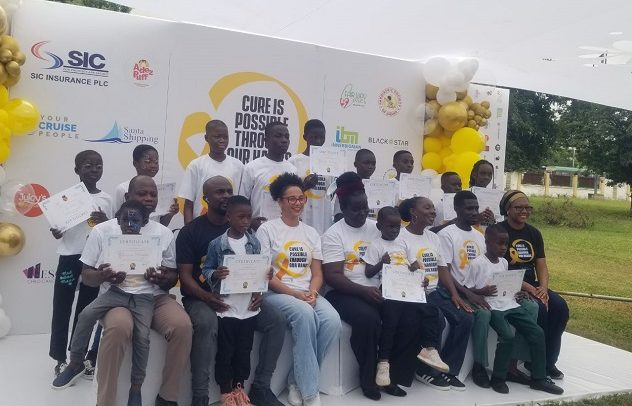Survivals, health expert in a group photograph
PAEDIATRIC ONCOLOGIST, at the Greater Accra Regional Hospital, Dr. Nihad Salifu has explained that childhood cancer differs significantly from cancer in adults as they can be cured when reported early at the hospital.
Speaking at this year’s launch of the Childhood Cancer Awareness Month, Dr. Salifu highlighted that timely reporting to hospitals can significantly increase the chances of curing childhood cancer.
“Sometimes we talk about childhood cancers, and people think they are the same as adult cancers. The difference is that childhood cancers are highly curable. We need to identify the children early, we need to make the right diagnosis, and we need to administer the right treatment,” she said.
Dr. Nihad Salifu revealed that the country is expected to diagnose between 1,200 and 1,500 cases annually; however, current figures indicate only about 500 diagnoses each year.
“This under diagnosis underscores the critical need for awareness,” she stated. Adding that the financial burden associated with cancer treatment is another hurdle.
“In pediatric oncology centers across the country, families often struggle to secure funds for necessary diagnostic tests and supportive care,” Dr. Salifu explained.
This supportive care includes essential services such as blood transfusions, pain management, and nutritional support, alongside the actual cancer treatment, which may involve chemotherapy, surgery, or radiotherapy.
Dr. Salifu noted that while some children may only miss six months of school due to treatment, the most common cancer in Ghana can require a year away from education.
Despite these challenges, Dr. Salifu remains optimistic. In well-established centers in high-income countries, cure rates for childhood cancer exceed 80%.
In contrast, Ghana struggles to reach a cure rate of 40% to 60%, primarily due to late presentations.
As Childhood Cancer Awareness Month unfolds, Dr. Nihad Salifu’s call to action resonates with increased awareness and early intervention to transform the landscape of childhood cancer treatment in the country, ensuring that more children can reclaim their futures.
In a concerted effort to improve early detection of childhood cancer, Dr. Efua Commeh, Non-Communicable Diseases Programme Manager at the Ghana Health Service (GHS), announced that primary healthcare providers across the nation are receiving specialised training.
Dr. Commeh explained that nurses, physician assistants, doctors, midwives, and all health workers who interact with children are being equipped to identify early signs of the disease.
“All they need to do is identify and refer,” she stated. Dr. Commeh emphasised that referrals will not be made to secondary facilities but directly to designated treatment centers.
“We want to streamline the process so that children can receive timely care,” she said.
The main treatment sites in Ghana include Korle Bu Teaching Hospital, Komfo Anokye Teaching Hospital, Cape Coast Teaching Hospital, Agogo Hospital, Holy Family Hospital in Techiman, Tamale Teaching Hospital, and others.
By Prince Fiifi Yorke


